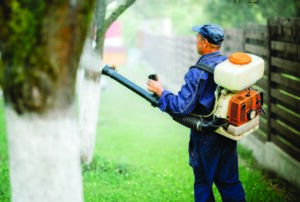Research Indicates Mosquito Insecticide Treatments on Individual Properties May Contribute to Mosquito Resistance and Increase the Risk of Vector-Borne Diseases.
 Chicago, IL, May 19, 2021: Hiring a commercial pest control company to control mosquitoes in your backyard this summer may do more harm than good.
Chicago, IL, May 19, 2021: Hiring a commercial pest control company to control mosquitoes in your backyard this summer may do more harm than good.
“We’ve seen that some of these individual measures reduce the effectiveness of mosquito control by mosquito abatement districts,” said Ryan Anderson, the Community Outreach Specialist for the non-profit IPM Institute of North America. “We’re particularly concerned with homeowners purchasing mosquito control for their yards from private contractors.”
Anderson said that private mosquito control companies most often use barrier treatments of the pyrethroid class of insecticides. Barrier treatments remain active for an extended period on surfaces where mosquitoes rest and feed. Adult mosquitoes that encounter the “barrier” of insecticide residues on treated surfaces usually die.
“Unfortunately, the pyrethroid class of insecticides has become less effective over time in controlling mosquitoes,” Anderson said.
A Loyola University lab sampled Culex pipiens mosquitoes, which can carry West Nile Virus (WNV), in the North Chicago Suburbs in 2018 and 2019 for resistance to ultra-low-volume (ULV) adult control insecticides. Unlike barrier treatments, ULV treatments break down rapidly and are not intended to persist in the environment.
The Loyola lab exposed 1,151 mosquitoes to the pyrethroid Sumithrin in treated bottles and 1,463 to the pyrethroid Permethrin in treated bottles. After 45 minutes, approximately 78.5% of mosquitoes died in the Sumithrin treated bottles and 83.3% died in the Permethrin treated bottles. These results did not match CDC expectations that 100% of the mosquitoes would die under these conditions. The surviving mosquitoes pass their resistance to the next generation decreasing the ability of ULV pyrethroid treatments to control mosquitoes and disease outbreaks over time.
“We need to limit the use of pyrethroids to times when they are truly needed to prevent mosquitoes from developing greater resistance,” Anderson said.
The North Shore Mosquito Abatement District (NSMAD), a local government agency mandated with controlling mosquito populations and minimizing the risk of mosquito-borne diseases, is one entity that utilizes ULV applications of pyrethroids to quickly kill adult mosquitoes on contact when WNV or other mosquito-borne illnesses exceed scientifically established thresholds. The application method of pyrethroid barrier treatments, on the other hand, requires repeated and high amounts of product to control mosquito populations across a community.
“For the NSMAD to adequately decrease mosquito populations with barrier treatments, we would need to thoroughly treat the many mosquito resting and feeding spaces of shrubs, trees and plants, while trying to avoid flowers, blooms, food crops or drift of the product into adjacent areas,” said NSMAD Executive Director, Dr. Mark Clifton. “This method does not make economical or ecological sense to stop the spread of WNV and other mosquito-borne diseases.”
Instead, the NSMAD follows a more effective and targeted integrated pest management (IPM) program that focuses control of mosquitoes in their immature stages when they reside in readily identifiable locations such as catch basins, ditches and other flood prone areas.
“We eliminate mosquito breeding grounds by dumping or draining standing water or by using a product to kill the larvae,” Dr. Clifton explained. “Our larval control uses bacteria that damage the digestive or nervous system of mosquito larvae when consumed, without harming other organisms.”
The NSMAD, IPM Institute and other community advocates recommend implementing IPM in your own backyard as opposed to resorting to scheduled barrier treatments from a private contractor. IPM Institute’s sustainable landscaping initiative, Midwest Grows Green (MGG), partnered with Go Green Wilmette to develop a mosquito control factsheet that covers four easy backyard control measures of eliminating standing water, encouraging natural predators, preventing contact with mosquitoes and preventing mosquito bites.
“Suburbs have great potential to help restore populations of beneficial insects such as butterflies and bees, which have been devastated in recent years. Pyrethroids and other mosquito control products are toxic to these insects. Reducing or eliminating barrier treatments to control mosquitoes in private yards is essential for us to reach the goal of being part of the solution for pollinators,” said Go Green Wilmette president Beth Drucker.
MGG provides this factsheet free of charge at bit.ly/MGGbarriers. The factsheet includes further resources and links to mosquito abatement districts across the Greater Chicago area.
###
About Midwest Grows Green
Midwest Grows Green is an initiative of the IPM Institute of North America, Inc. that accomplishes large scale behavior change by sharing pesticide and fertilizer reduction information at critical places where lawns influence our lives. The IPM Institute is an independent 501(c)3 non-profit started in 1998 that improves sustainability in agriculture and communities through market mechanisms based in Integrated Pest Management.
